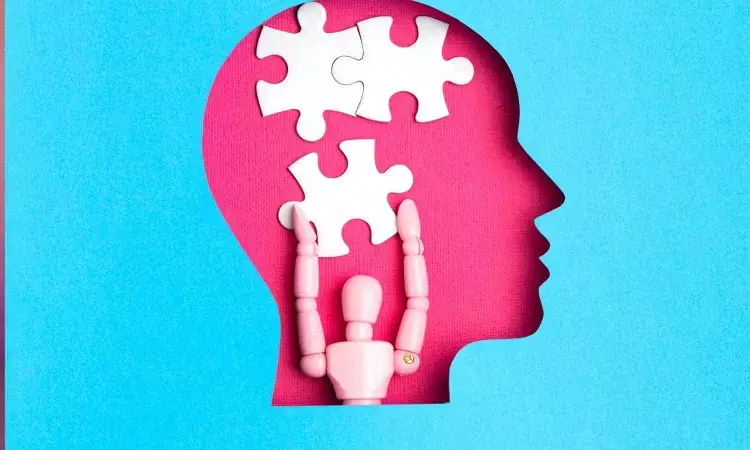- Home
- Medical news & Guidelines
- Anesthesiology
- Cardiology and CTVS
- Critical Care
- Dentistry
- Dermatology
- Diabetes and Endocrinology
- ENT
- Gastroenterology
- Medicine
- Nephrology
- Neurology
- Obstretics-Gynaecology
- Oncology
- Ophthalmology
- Orthopaedics
- Pediatrics-Neonatology
- Psychiatry
- Pulmonology
- Radiology
- Surgery
- Urology
- Laboratory Medicine
- Diet
- Nursing
- Paramedical
- Physiotherapy
- Health news
- Fact Check
- Bone Health Fact Check
- Brain Health Fact Check
- Cancer Related Fact Check
- Child Care Fact Check
- Dental and oral health fact check
- Diabetes and metabolic health fact check
- Diet and Nutrition Fact Check
- Eye and ENT Care Fact Check
- Fitness fact check
- Gut health fact check
- Heart health fact check
- Kidney health fact check
- Medical education fact check
- Men's health fact check
- Respiratory fact check
- Skin and hair care fact check
- Vaccine and Immunization fact check
- Women's health fact check
- AYUSH
- State News
- Andaman and Nicobar Islands
- Andhra Pradesh
- Arunachal Pradesh
- Assam
- Bihar
- Chandigarh
- Chattisgarh
- Dadra and Nagar Haveli
- Daman and Diu
- Delhi
- Goa
- Gujarat
- Haryana
- Himachal Pradesh
- Jammu & Kashmir
- Jharkhand
- Karnataka
- Kerala
- Ladakh
- Lakshadweep
- Madhya Pradesh
- Maharashtra
- Manipur
- Meghalaya
- Mizoram
- Nagaland
- Odisha
- Puducherry
- Punjab
- Rajasthan
- Sikkim
- Tamil Nadu
- Telangana
- Tripura
- Uttar Pradesh
- Uttrakhand
- West Bengal
- Medical Education
- Industry
Excessive Coffee Consumption Linked to Faster Cognitive Decline, Study Finds

USA: A recent study presented at the Alzheimer's Association International Conference (AAIC) 2024 revealed that drinking over three cups of coffee daily may accelerate cognitive decline, according to a large study.
Researchers explored how varying amounts of coffee and tea affect fluid intelligence, which encompasses cognitive abilities like abstract reasoning, pattern recognition, and logical thinking. They revealed that moderate coffee consumption served as a protective factor against cognitive decline.
Cognitive development refers to the progression of mental processes and abilities that allow individuals to acquire, process, and use knowledge and information. Tea and coffee, both rich in caffeine and antioxidants, can influence cognitive development and function in various ways. Both of these are beneficial in the short term and reduce the risk of cognitive decline and neurodegenerative diseases over time. Observational and epidemiologic studies indicate that the consumption of coffee and tea has a beneficial effect on stroke, heart failure, cancer, Parkinson’s disease and diabetes. Considering this, Pauline Anderson, et al conducted a study to evaluate the cognitive function at baseline with an additional two patient visits.
For this purpose, the research team investigated the relationship between coffee and tea intake and cognitive decline over time in a larger sample of older adults. They divided the coffee and tea consumption into tertiles: high, moderate, and no consumption.
To conduct the research, the researchers included 8451 individuals, from UK Biobank which includes 60% females and 97% white cognitively impaired adults and are older than 60 years. All the subjects had a body mass index of 26, and 26% were apolipoprotein epsilon 4 gene carriers.
They found the following results: -
• 18% reported daily consumption of coffee drinking as high consumption ( four or more cups), 58% reported drinking one to three cups in a day and considered as moderate consumption and 25% reported that they never drink coffee.
• 47% reported drinking four or more cups of tea in a day and considered as high consumption, 38% reported drinking one to three cups in a day considered as moderate consumption and 15 % reported that they never drink tea.
• After 8.83 years of monitoring, individuals who drank four or more cups of coffee a day experienced a slower decrease in fluid intelligence compared to those who never drank coffee and those with moderate coffee consumption.
• During the follow-up period, individuals with high coffee consumption experienced the most rapid decline in fluid intelligence compared to those with moderate coffee consumption and those who never drank coffee.
• Moderate coffee consumption appears to offer a degree of protection against cognitive decline.
• Individuals who never drank tea experienced a greater decline in fluid intelligence compared to those who consumed it moderately or heavily.
“Consumption of coffee and tea may offer a safe and affordable approach to delaying the onset and lowering the risk of Alzheimer's disease”, the researchers concluded.
Deepanshi Bhatnagar (MSc Nutrition and Dietetics) is a professional with a master's degree in Nutrition and Dietetics from MRIIRS. With a strong academic background, she is well-versed in the principles of nutrition and dietary science. At Medical Dialogues, Deepanshi serves as the correspondent for fact-checking, where she is responsible for verifying and evaluating claims related to nutrition and diet, ensuring that all content is accurate, evidence-based, and scientifically sound.
Dr Kamal Kant Kohli-MBBS, DTCD- a chest specialist with more than 30 years of practice and a flair for writing clinical articles, Dr Kamal Kant Kohli joined Medical Dialogues as a Chief Editor of Medical News. Besides writing articles, as an editor, he proofreads and verifies all the medical content published on Medical Dialogues including those coming from journals, studies,medical conferences,guidelines etc. Email: drkohli@medicaldialogues.in. Contact no. 011-43720751


